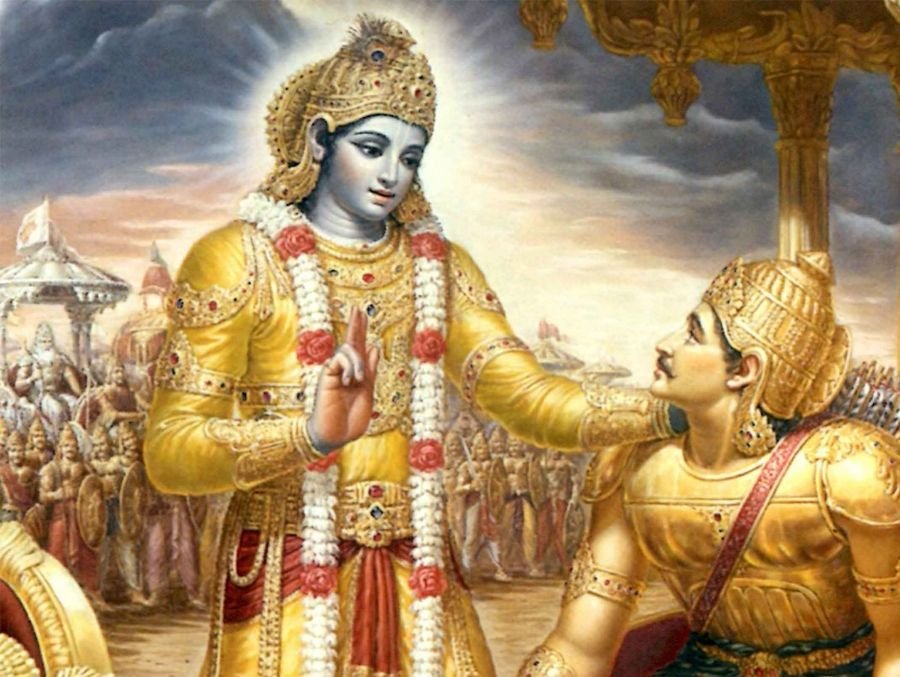The study of the Shrimad Bhagavad Gita begins with the recital of the Bhagavad Gita dhyana shlokas. By doing Gita Dhyanam, one pays homage to the Divine that brought us this wisdom. The Bhagavad Gita Dhyana Shlokas, exalt the Divine virtues. Some say they were written by Madhusudana Saraswati while others attribute it to Shridhara Swami.
Description
The Gita Dhyanam, also known as the Gita Dhyana or Bhagavad Gita Dhyana shlokas, related to the Bhagavad Gita, it is a 9-verse Sanskrit poetry frequently associated with the Bhagavad Gita, one of Hinduism’s most fundamental scriptures.
Its English title simply translates to “meditation on the Gita,” and it is also known as the “Invocation to the Gita.” The nine Gita Dhyanam verses salute many ancient scriptures, Gods, and other entities, describe Gita’s relationship to the Upanishads and proclaim the power of divine help.
The Gita Dhyanam is similar to a prayer. The goal of learning the prayer verses is to obtain the Lord’s blessings so that we can successfully complete the Bhagavad Gita study. To ward off any potential stumbling blocks. Although the Bhagavad Gita is a part of the Mahabharata, these prayer passages are not.
Gita Dhyana Shloka 1.
‘ॐ पार्थाय प्रतिबोधितां भगवता नारायणेन स्वयं
व्यासेन ग्रथितां पुराणमुनिना मध्ये महाभारते
अद्वैतामृतवर्षिणीं भगवतीमष्टादशाध्यायिनीं
अम्ब त्वामनुसन्दधामि भगवद्गीते भवद्वेषिणीम्
oṃ pārthāya pratibodhitāṃ bhagavatā nārāyaṇena svayaṃ
vyāsena grathitāṃ purāṇamuninā madhye mahābhārate
advaitāmṛtavarṣiṇīṃ bhagavatīmaṣṭādaśādhyāyinīṃ
amba tvāmanusandadhāmi bhagavadgīte bhavadveṣiṇīm
Meaning
Lord Narayana gave Partha (Arjuna) directions in the Bhagavad Gita, which was afterwards compiled by ancient and skilled Veda Vyasa and included in the Mahabharata. Oh Mother goddess who showers the nectar of Advaitha called the Bhagavad Gita, Which has eighteen chapters, I meditate on you mother who removes the cycle of rebirth.
Gita Dhyana Shloka 2.
नमोऽस्तु ते व्यास विशालबुद्धे
फुल्लारविन्दायातपत्रनेत्रे
येन त्वया भारततैलपूर्णः
प्रज्वलितो ज्ञानमयः प्रदीपः
namo’stu te vyāsa viśālabuddhe
phullāravindāyātapatranetre
yena tvayā bhāratatailapūrṇaḥ
prajvalito jñānamayaḥ pradīpaḥ
Meaning
I bow to you, Vyasadeva, for your wide and profound understanding. With gorgeous eyes (not the physical but the Third Eye) like the petals of a fully blossomed lotus (Stories of Shrimad Bhagavatam). You have lit the lamp of wisdom with the oil called Bharatham.
Gita Dhyana Shloka 3.
प्रपन्नपरिजाताय
तोत्रवेत्रैकपाणये
ज्ञानमुद्राय कृष्णाय
गीतामृतदुहे नमः
prapannaparijātāya
totravetraikapāṇaye
jñānamudrāya kṛṣṇāya
gītāmṛtaduhe namaḥ
Meaning
My respects to Lord Krishna, who is the shelter for those who have been born from the sea (Lakshmi). Holding a staff in the shape of a crane head to tend to the cattle, and raising the other hand with the thumb touching the tip of the forefinger to indicate divine knowledge. He is the milker of the Bhagavad Gita’s immortal nectar.
Gita Dhyana Shloka 4.
सर्वोपनिषदो गावो
दोग्धा गोपालनन्दनः
पार्थो वत्सः सुधीर्भोक्ता
दुग्धं गीतामृतं महत्
sarvopaniṣado gāvo
dogdhā gopālanandanaḥ
pārtho vatsaḥ sudhīrbhoktā
dugdhaṃ gītāmṛtaṃ mahat
Meaning
All the Upanishads are the cows and Krishna is the one who milks. The milker is the son of the cowherd, Gopalanandana, and Arjuna, son of Prutha, is the calf if the entire Upanishads are likened to cows. The drinkers are persons of pure intelligence, and the greatest nectar of Gita is milk.
Gita Dhyana Shloka 5.
वसुदेवसुतं देवं
कंसचाणूरमर्दनम्
देवकीपरमानन्दं
कृष्णं वन्दे जगद्गुरुम्
vasudevasutaṃ devaṃ
kaṃsacāṇūramardanam
devakīparamānandaṃ
kṛṣṇaṃ vande jagadgurum
Meaning
I bow to Lord Krishna, Vasudeva’s son and the Universe’s preceptor. His mother Devaki’s Supreme Bliss and the destroyer of the demons Kamsa and Chanoora.
Gita Dhyana Shloka 6.
भीष्मद्रोणतटा जयद्रथजला गान्धारीनीलोत्पला
शल्यग्राहवती कृपेण वहिनी कर्णेन वेलाकुल
अश्वत्तामविकर्णघोरमकरा दुर्योधनावर्तिनी
सोत्तीर्णा खलु पाण्डवार्णवनदी कैवर्तकः केश्वः
bhīṣmadroṇataṭā jayadrathajalā gāndhārīnīlotpalā
śalyagrāhavatī kṛpeṇa vahinī karṇena velākula
aśvattāmavikarṇaghoramakarā duryodhanāvartinī
sottīrṇā khalu pāṇḍavārṇavanadī kaivartakaḥ keśvaḥ
Meaning
Bhishma and Drona are the banks on the Kurukshetra battleground. Water is Jayadratha, and the water lily represents Shakuni, the King of Gandhara. Shalya represents the shark, Krupa represents the flow, and Karna represents the massive waves. Duryodhana is the whirlpool, while Asvatthama and Vikarna are the deadly crocodiles. The Pandavas were able to cross the river of conflict with the help of Kesava, the boatman.
Gita Dhyana Shloka 7.
पाराशर्यवचः सरोजममलं गीतार्थगन्धोत्कटं
नानाख्यानककेशरं हरिकथासम्बोधनाबोधितम्
लोके सज्जनषट्पदैरहरहः पेपीयमानं मुदा
भूयाद्भारतपङ्कजं कलिमलप्रध्वंसनं श्रेयसे
pārāśaryavacaḥ sarojamamalaṃ gītārthagandhotkaṭaṃ
nānākhyānakakeśaraṃ harikathāsambodhanābodhitam
loke sajjanaṣaṭpadairaharahaḥ pepīyamānaṃ mudā
bhūyādbhāratapaṅkajaṃ kalimalapradhvaṃsanaṃ śreyase
Meaning
May the spotless lotus of the Mahabharata, which was created by the water of Parasara’s son, Vyasa’s words, with many stories as stamens, which blossoms by discourses on Sri Hari’s divine stories, which is quaffed daily with pleasure in this world by saintly individuals who are like honey bees seeking nectar from the fragrant Bhagavad Gita, which also serves as the remover of all sins in the Kaliyuga. May the Mahabharata’s lotus bestow the highest goodness on us!
Gita Dhyana Shloka 8.
मूकं करोति वाचालं
पङ्गुं लङ्घायते गिरिम्
यत्कृपा तमहं वन्दे
परमानन्दमाधवम्
mūkaṃ karoti vācālaṃ
paṅguṃ laṅghāyate girim
yatkṛpā tamahaṃ vande
paramānandamādhavam
Meaning
If he enjoys the grace of Madhava, the Supreme Bliss, a dumb person can speak and a lame person can jump up the hill.
Gita Dhyana Shloka 9.
यं ब्रह्मा वरुणेन्द्ररुद्रमरुतः स्तुन्वन्ति दिव्यैः स्तवैर्
वेदैः साङ्गपदक्रमोपनिषदैर्गायन्ति यं सामगाः
ध्यानावस्थिततद्गतेन मनसा पश्यन्ति यं योगिनो
यस्यान्तं न विदुः सुरासुरगणा देवाय तस्मै नमः
yaṃ brahmā varuṇendrarudramarutaḥ stunvanti divyaiḥ stavair
vedaiḥ sāṅgapadakramopaniṣadairgāyanti yaṃ sāmagāḥ
dhyānāvasthitatadgatena manasā paśyanti yaṃ yogino
yasyāntaṃ na viduḥ surāsuragaṇā devāya tasmai namaḥ
Meaning
Let us all bow down to Lord Sri Krishna, whom Brahma, Varuna, Indra, Rudra, Marutas, and all divine beings honour in the Vedas and their supplementary sections, such as the Upanishads, with glorious songs Whom the followers of Sama Veda glorify with song, whom renowned mystics behold with their minds engrossed in perfect meditation, and of whom all the hosts of demigods and demons have no knowledge of the limits. Let every reverence be paid to him, the Supreme Lord.
Let’s learn to live with “The Gita” via Meditation Affinity…
